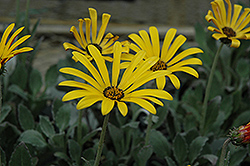Fri & Sat 8am - 8pm
Sun 8am - 7pm
Anytown, USA 12345
fax: 261.787.0463
e-mail: info@successgc.com


Plant Finder

Height: 10 inches
Spread: 12 inches
Sunlight:
![]()
Hardiness Zone: 9a
Other Names: Aurora Daisy
Group/Class: The Ravers Series
Description:
An eye catching groundcover perennial that produces stunning yellow blooms with gold and black centers; tolerates freezing temperatures only briefly; deadhead regularly to promote new blooms; tolerates light shade only
Ornamental Features
The Ravers Bumble Bee African Daisy features showy yellow daisy flowers with gold eyes and black centers at the ends of the stems from mid fall to late spring. The flowers are excellent for cutting. Its tomentose pointy leaves remain grayish green in color throughout the season.
Landscape Attributes
The Ravers Bumble Bee African Daisy is a dense herbaceous perennial with a ground-hugging habit of growth. Its medium texture blends into the garden, but can always be balanced by a couple of finer or coarser plants for an effective composition.
This plant will require occasional maintenance and upkeep, and is best cleaned up in early spring before it resumes active growth for the season. It has no significant negative characteristics.
The Ravers Bumble Bee African Daisy is recommended for the following landscape applications;
- Rock/Alpine Gardens
- General Garden Use
- Groundcover
Planting & Growing
The Ravers Bumble Bee African Daisy will grow to be about 8 inches tall at maturity, with a spread of 12 inches. Its foliage tends to remain low and dense right to the ground. It grows at a medium rate, and under ideal conditions can be expected to live for approximately 10 years. As an herbaceous perennial, this plant will usually die back to the crown each winter, and will regrow from the base each spring. Be careful not to disturb the crown in late winter when it may not be readily seen!
This plant should only be grown in full sunlight. It does best in average to evenly moist conditions, but will not tolerate standing water. It is not particular as to soil pH, but grows best in rich soils. It is somewhat tolerant of urban pollution. This particular variety is an interspecific hybrid.
